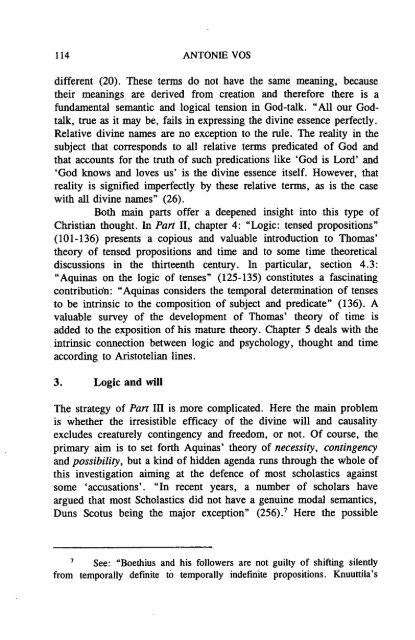Jaarboek Thomas Instituut 1997 - Thomas Instituut te Utrecht
Jaarboek Thomas Instituut 1997 - Thomas Instituut te Utrecht
Jaarboek Thomas Instituut 1997 - Thomas Instituut te Utrecht
You also want an ePaper? Increase the reach of your titles
YUMPU automatically turns print PDFs into web optimized ePapers that Google loves.
114 ANTONIE VOS<br />
different (20). These <strong>te</strong>rms do not have the same meaning, because<br />
their meanings are derived from creation and therefore there is a<br />
fundamental semantic and logical <strong>te</strong>nsion in God-talk. "All our Godtalk,<br />
true as it may be, fails in expressing the divine essence perfectly.<br />
Relative divine names are no exception to the rule. The reality in the<br />
subject that corresponds to all relative <strong>te</strong>rms predica<strong>te</strong>d of God and<br />
that accounts for the truth of such predications like 'God is Lord' and<br />
'God knows and loves us' is the divine essence itself. However, that<br />
reality is signified imperfectly by these relative <strong>te</strong>rms, as is the case<br />
with all divine names" (26).<br />
Both main parts offer a deepened insight into this type of<br />
Christian thought. In Part II, chap<strong>te</strong>r 4: "Logic: <strong>te</strong>nsed propositions"<br />
(101-136) presents a copious and valuable introduction to <strong>Thomas</strong>'<br />
theory of <strong>te</strong>nsed propositions and time and to some time theoretical<br />
discussions in the thir<strong>te</strong>enth century. In particular, section 4.3:<br />
"Aquinas on the logic of <strong>te</strong>nses" (125-135) constitu<strong>te</strong>s a fascinating<br />
contribution: "Aquinas considers the <strong>te</strong>mporal de<strong>te</strong>rmination of <strong>te</strong>nses<br />
to be intrinsic to the composition of subject and predica<strong>te</strong>" (136). A<br />
valuable survey of the development of <strong>Thomas</strong>' theory of time is<br />
added to the exposition of his mature theory. Chap<strong>te</strong>r 5 deals with the<br />
intrinsic connection between logic and psychology, thought and time<br />
according to Aristo<strong>te</strong>lian lines.<br />
3. Logic and will<br />
The stra<strong>te</strong>gy of Part III is more complica<strong>te</strong>d. Here the main problem<br />
is whether the irresistible efficacy of the divine will and causality<br />
excludes creaturely contingency and freedom, or not. Of course, the<br />
primary aim is to set forth Aquinas' theory of necessity, contingency<br />
and possibility, but a kind of hidden agenda runs through the whole of<br />
this investigation aiming at the defence of most scholastics against<br />
some 'accusations'. "In recent years, a number of scholars have<br />
argued that most Scholastics did not have a genuine modal semantics,<br />
Duns Scotus being the major exception" (256).7 Here the possible<br />
See: "Boethius and his followers are not guilty of shifting silently<br />
from <strong>te</strong>mporally defini<strong>te</strong> ti> <strong>te</strong>mporally indefini<strong>te</strong> propositions. Knuuttila's








